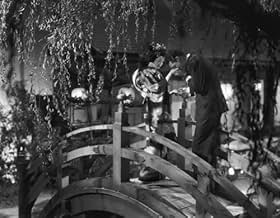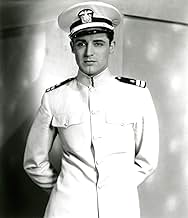Ajouter une intrigue dans votre langueLieutenant Pinkerton marries geisha-in-training but soon after abandons her and goes back to the US.Lieutenant Pinkerton marries geisha-in-training but soon after abandons her and goes back to the US.Lieutenant Pinkerton marries geisha-in-training but soon after abandons her and goes back to the US.
- Réalisation
- Scénario
- Casting principal
- Récompenses
- 1 victoire au total
- Bridesmaid
- (non crédité)
Avis à la une
Sylvia Sydney is incredible. She's more convincing as the embodiment of Cho Cho San, than most actors of the era, who seemed largely to be playing as if to audience than camera. (Not that I'm knocking it, the 30s and silent are my favs. Just sayin'. Psst it's the scenes and costumes. Moving Art.)
This version of Madame Butterfly absolutely worthwhile! If for the performance of Sydney and her costumes alone. Okay, and Grant's pretty face. One warning for opera lovers though: Other reviews point to Puccini's "incidental" music throughout. I may be wrong, but I only heard the overture at the opening credits and the main aria at the end. Everything in the middle not Puccini as far as I can tell. I say, still worth it.
Those outraged at the casting of a Jewish/American actress as a geisha should also take note of the fact that All-American cad Pinkerton is played by a Bristolian.
As for the plot, Lieutenant Benjamin Franklin Pinkerton (Cary Grant) and Lieutenant Barton (Charlie Ruggles) are two American Navy officers on shore in Japan. At a gathering, Pinkerton meets Cho-Cho San (Sylvia Sidney), a beautiful Japanese maiden who is about to become a Geisha. She disgraces her family by accepting Pinkerton's love to become his bride. Although she takes her marriage vows seriously, theirs are not truly bound with love. After the "honeymoon" is over, Pinkerton returns to the states with the fleet, with Cho-Cho San, whom Pinkerton has nicknamed "Butterfly," remaining in Japan where she keeps his home until he returns. Three years pass. During that time, Cho-Cho San, has given birth to a son she names "Trouble" (Philip Horomate). She is still confident that someday her husband will return to her. But what has happened to Pinkerton during that time? Did he go down with his ship? No quite. He has married his fiancé, an American girl named Adelaide (Sheila Terry), whom he intends on taking with him to Japan.
Sylvia Sidney, who by this time has been playing tragic American heroines in such Depression dramas as AN American TRAGEDY and STREET SCENE (both 1931), resumes playing this sort of role, but this time as a Japanese girl. She gives a believable performance, particularly with her round doll face features. Cary Grant, still relatively new to films and on a fast rise to leading man status, is acceptable as Pinkerton, giving one of his more noted performances during his early years as a screen actor, which began the very year of the release of MADAME BUTTERFLY. Charlie Ruggles provides some humorous moments as Barton.
The supporting cast includes: Helen Jerome-Eddy and Grandma San; Edmund Breese as Cho-Cho's grandfather; Sandor Kallay as Goro; with Irving Pichel as Yomadori; Berton Churchill as Sharpless; and Louise Carter as Suzuki.
Rarely seen in recent years, MADAME BUTTERFLY used to have frequent revivals during the mid afternoon or after midnight hours on commercial television way back in the 1960s and 70s, and with Cary Grant who had reached super star status in motion pictures lasting more than 20 years (retiring in 1966), his name alone would guarantee viewer-ship whenever shown.
While MADAME BUTTERFLY is an acceptable version based on David Belasco's play, the plot, however, can be a trifle slow at times during its 85 minutes of screen time, but Sylvia Sidney's performance, the presence of Cary Grant, as well as the reproduction of Japanese settings, make this curio worth watching, it it could ever be found or revived again. (***)
Like most of Sylvia Sidney's roles in this period, the audience waits for the moment when she breaks down in inconsolable tears over the unworthy B.F. Pinkerton. Gary Cooper had been proposed to play the role. Cooper was too important, and Cary Grant was young, very good-looking, and wouldn't cost the production much in the part; given how much set designer Wiard Ihnen and costume designer Travis Banton were spending, it was a good choice. Grant isn't called to be on screen for that long, and isn't called on to do much in the way of acting; Berton Churchill as the American consulate, offers a far more nuanced performance in about four minutes of screen time.
It's clear why this movie disappeared for decades. With suicide, bigamy and miscegenation in the mix, there was no way to re-release it under the Production Code. Alas, if it's not one thing, it's another; nowadays, its use of yellowface renders it equally problematic. Nonetheless, looking at it through the character's broken English, it's another of Miss Sidney's fine performances in a heartbreaking story, one that convinces me that sentimentality and feminism is a good thing.... at least by late 19th century standards. And the visuals are superb.
Le saviez-vous
- AnecdotesThe Japanese censor cut a scene where Cary Grant and Sylvia Sidney share an embrace, because Miss Sidney's elbow was exposed.
- GaffesWhen the US Navy returns to Tokyo Bay/Yokohama, mountains are seen rising from the sea. There are no mountains in that area.
- Citations
Cho-Cho San: Do not weep, Mama-san.
Cho-Cho's mother: But you are so young and never have you been away from home before.
Cho-Cho San: But consider Mama-san, soon I shall be very great geisha and then you and the august grandfather and the little brother will have much money.
Cho-Cho's grandfather: This is no place for the daughter of my son, the daughter of a noble samurai. I should never have consented to your coming here.
Cho-Cho San: But we must live and I'm the only one who can work and help.
Cho-Cho's grandfather: Your father died with honour when he could no longer live with honour.
Cho-Cho San: Is it then so shameful to make people happy? To sing for them, to make music, and dance? And I may make a fine marriage. Then I can buy you many gifts
- ConnexionsReferenced in Jeopardy!: Épisode #1.2 (1984)
Meilleurs choix
- How long is Madame Butterfly?Alimenté par Alexa
Détails
- Date de sortie
- Pays d’origine
- Langue
- Aussi connu sous le nom de
- Мадам Батерфляй
- Lieux de tournage
- Société de production
- Voir plus de crédits d'entreprise sur IMDbPro
- Durée1 heure 26 minutes
- Couleur
- Rapport de forme
- 1.37 : 1
Contribuer à cette page


































